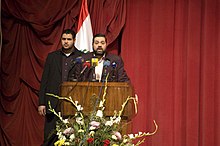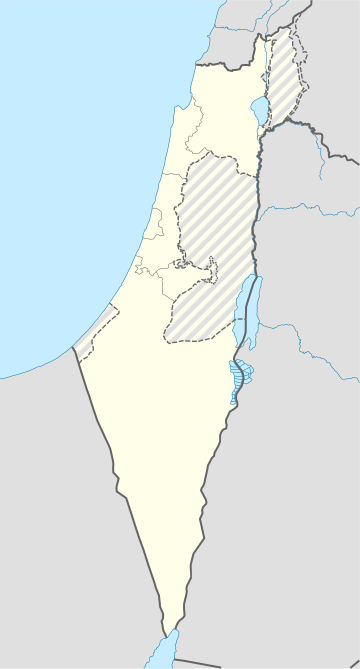Osama Hamdan
Osama Hamdan | |
|---|---|
 Osama Hamdan in Beirut, 2009 | |
| Hamas Representative in Lebanon | |
| In office 1998–2009[1] | |
| Succeeded by | Ali Baraka |
| Hamas Representative in Tehran | |
| In office 1993–1998[1] | |
| Personal details | |
| Born | 1965 (age 58–59) Bureij refugee camp, Gaza Strip |
| Nationality | Palestinian |
| Political party | Hamas |
| Hamas biographies |
|---|
| Map: Birthplaces and family origins. |
| Abbreviations
|
|
| Politicians and officials
|
|
| Other biography pages
|
|
Osama Hamdan (Arabic: أسامة حمدان; born 1965) is a former senior representative of Hamas in Lebanon and Tehran. He previously held the position of Head of International Relations Department for Hamas.[1][2][3]
Early life
Hamdan was born in the Bureij refugee camp in the Gaza Strip to a Palestinian refugee family that fled the village of al-Batani al-Sharqi during the 1948 Arab-Israeli War. He attended high school in Kuwait, graduating in 1982. He then enrolled at the Yarmouk University in Irbid, Jordan where he graduated with a Bachelor's Degree in Chemistry in 1986. While he was at university, Hamdan became an activist with the Islamic Student Movement. He returned to Kuwait after graduating and worked in the industrial sector until the Gulf War in 1990.[4]
Hamas representative
After leaving Kuwait, Hamdan worked at the Hamas office in Tehran as assistant to then Hamas representative Imad al-Alami from 1992 to 1993. He became Hamas' official representative in Iran in 1994, serving in that post until 1998.[4] While undertaking this post, Hamdan said that the "flourishing relations" between Iran and Hamas were at the expense of the once-good relationship between Iran and the Palestinian Liberation Organization (PLO). However, he stated "There is an absence of any proof or evidence of Iranian financial support to Hamas, Islamic Jihad and other Palestinian factions who have established contacts with Iran. It is merely rumours and speculation."[5]
In 1998, Hamdan was appointed as Hamas representative in Lebanon, a post he retains. In 2004, he served as Hamas' spokesman in Cairo during a dialogue between Palestinian factions. He has also participated in talks between Hamas and European officials.[4] Hamdan has advocated Palestinian unity talks and in an interview with Al-Arabiya on May 20, 2009, he said "I understand that each of us [Hamas and Fatah] must set conditions to reach an agreement. National dialogue must be based on national interests of the Palestinian people..."[6]
In an interview which aired on Al-Jadid/New TV on May 4, 2011 as translated by MEMRI, Hamdan stated that "politically, the two-state solution is over" and that "we are entering the phase of the liberation of Palestine... the notion of Return: the return of the refugees to their homeland, and the return of the Israelis to the countries from which they came."[7]
During the 2023 Israel–Hamas war Hamadan acted as a media representative for Hamas, appearing from Lebanon across multiple platforms and channels internationally for interview and comment across various issues.[8][9]
Controversies
In a 2007 interview which aired on the Tehran-based Arabic-language Al-Kawthar TV channel, Hamadan stated that suicide bombings against Israel were justified, especially bombing buses.[10]
In a 2014 interview which aired on the Hamas-affiliated Al-Quds TV channel as translated by MEMRI, Hamdan stated that "killing children...is engraved in the historical Zionist and Jewish mentality." Commenting on the accusation of blood libel against Jews, Hamdan stated "we all remember how the Jews used to slaughter Christians, in order to mix their blood in their holy matzos. This is not a figment of imagination or something taken from a film. It is a fact, acknowledged by their own books and by historical evidence."[11][better source needed]
In a subsequent interview with CNN's Wolf Blitzer, Hamdan defended his comments, stating that he was responding to comments made by Moshe Feiglin in the Israeli Knesset in which he called for the "complete destruction of the Palestinians in Gaza". Hamdan asserted that the organisation MEMRI had edited and 'cut' his words in a selective manner taking them out of context, going on to remark that "we are not against Jews, we are against the Israeli occupation".[12]
In 2018, he stated that even if a ceasefire were reached between Israel and Hamas, Hamas would still seek Israel's destruction.[2]
References
- ^ a b c "Osama Hamdan". Al Jazeera Forum. 2015-04-23. Retrieved 2024-06-27.
- ^ a b "Hamas official says terror group will continue to arm even if truce reached". The Times of Israel. 27 August 2018.
- ^ "Israel says hostage swap with Hamas won't begin before Friday". www.aa.com.tr. Archived from the original on 2023-11-29. Retrieved 2023-11-27.
- ^ a b c Palestinian Personalities - H Archived 1999-01-28 at the Wayback Machine Palestinian Academic Society for the Study of International Affairs.
- ^ Chehab, Zaki (2007). Inside Hamas: the untold story of militants, martyrs and spies. London: I.B. Tauris. p. 142. ISBN 978-1-84511-389-6.
- ^ "Hamas urges coexistence under Palestinian rule". Archived from the original on 2023-11-29.
- ^ Osama Hamdan, Head of the Hamas Foreign Liaisons: Armed Confrontation Will Continue to Be "the Backbone of the Resistance", the Israelis Must Return to Their Countries of Origin Al-Jadid/New TV (Lebanon), Clip No. 2949 (video), MEMRITV.org, May 4, 2011.
- ^ "'They have to admit they bombed the hospital', says Hamas spokesman". Channel 4 News. 2023-10-18. Retrieved 2023-12-06.
- ^ "Israeli minister supports 'voluntary migration' of Palestinians in Gaza". Al Jazeera. Retrieved 2023-12-07.
- ^ "Osama Hamdan, the Hamas representative in Lebanon, told Iranian television that suicide bombing attacks against Israel were justified, especially attacks in buses". Meir Amit Intelligence and Terrorism Information Center. 22 August 2007.
- ^ Top Hamas Official Osama Hamdan: Jews Use Blood for Passover Matzos, MEMRITV, Clip No. 4384 (transcript), July 28, 2014. (video clip available here Archived 2014-08-02 at the Wayback Machine)
- ^ Moss, Candida; Baden, Joel (2014-08-12) [August 6, 2014]. "Blood libel: the myth that fuels anti-Semitism – CNN Belief Blog". CNN. Archived from the original on 2014-08-12. Retrieved 2023-11-29.
Further reading
- Chehab, Zaki (2007). Inside Hamas: the untold story of militants, martyrs and spies. I.B. Tauris. ISBN 9781845113896.
External links
- Osama Hamdan on Charlie Rose
- Column archive at The Guardian
- Osama Hamdan collected news and commentary at Al Jazeera English
















